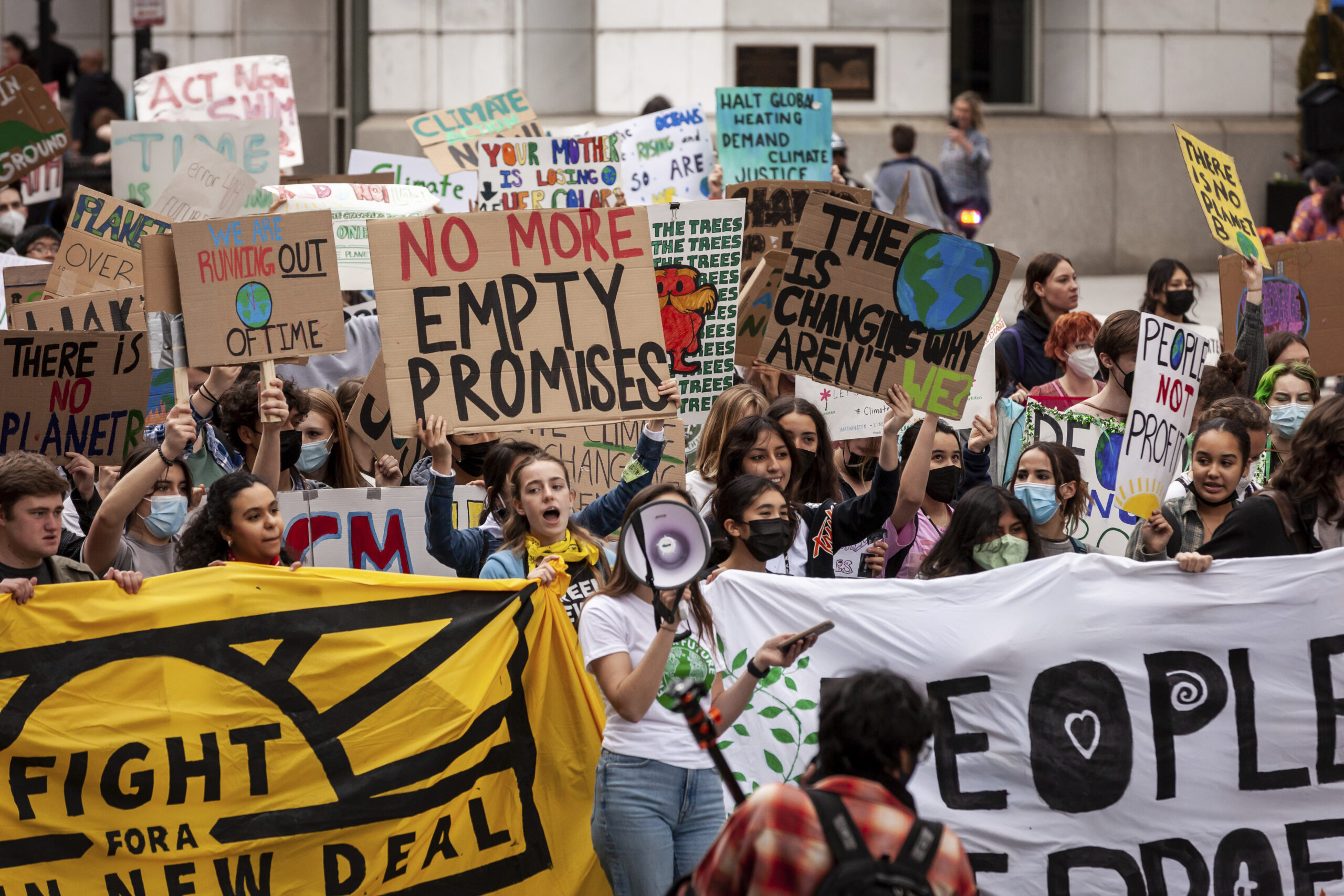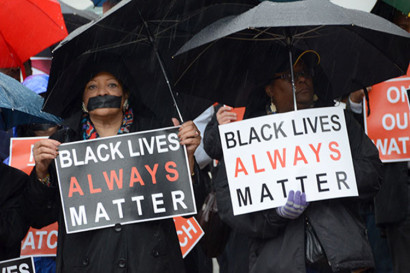Young voters have growing power, but broken politics leave them ‘fatalistic,’ studies find
Millennials and Gen Z face existential risks unknown to previous generations. The Berkeley Institute for Young Americans reports that these voters — left, center and right — want political action to address the challenges.

Allison Bailey/NurPhoto via AP
June 26, 2024
Young voters from the millennial generation and Gen Z are emerging as the demographic center of power in American politics, but new studies by UC Berkeley researchers find they are fatalistic about critical problems such as economic inequality, climate change and the future of democracy.
Younger voters had a broad, decisive impact on the 2020 presidential election and congressional elections in 2018 and 2022, according to research released today by the Berkeley Institute for Young Americans (BIFYA). Now, with the 2024 presidential election just months away, the institute’s analysis raises concerns about possibly low turnout among young voters in November.
Two new studies offer a deeply detailed look at the social values and political behaviors of voters aged 18-43 — and jarring insights into their generational zeitgeist. Some findings diverge sharply from prevailing stereotypes about the political behavior of young voters.
Surprisingly, the institute reports, the values of Gen Z and millennial voters across the political spectrum are converging toward agreement on key issues. But the researchers found a substantial generation gap in American politics: Both young liberals and young conservatives want effective government action to solve challenges, while their parents and grandparents have been in conflict for a half-century over the role of government.
At the same time, however, many young voters appear to share a belief that fractured, dysfunctional government systems are incapable of addressing critical challenges that fall heavily on their generations. A sense of fatalism extends across the right, center and left, according to the researchers.

Brandon Sánchez Mejia/UC Berkeley
“Millennials and Gen Zers are generations unlike any other because of the risks they face,” said Erin Heys, the institute’s policy director and senior researcher. “From the housing crisis to the threat of climate change and AI, young people are feeling hopeless about the challenges in front of them, and are disillusioned with a political system that is unresponsive to their needs.”
“In this pivotal election year, whether or not young people decide to vote could very well decide the outcome of the election,” said Sarah Swanbeck, BIFYA’s executive director. “These new papers give us an important first glimpse into one factor that could affect whether or not young people turn up at the polls: their increasing feeling of fatalism and a sense that the American Dream is farther and farther out of reach.”
The Berkeley institute, founded in 2015, undertakes pathbreaking research to better understand the unique challenges that younger generations are facing and to develop the public policy interventions needed to solve them. The institute is affiliated with Berkeley’s Goldman School of Public Policy.
A historic passing of power from old to young
The institute’s new research comes at a generational inflection point in U.S. politics.
Incumbent President Joe Biden is 81 years old, and his challenger, former President Donald Trump, is 78. It’s almost certain that the 2024 election will represent the end of an era in which politicians from the World War II and post-war generations dominated U.S. political leadership.
By some measures, millennials and Gen Z voters by 2028 will account for half of the electorate. And millions of young Gen Zers will be eligible to vote for the first time this year.
As a group, those tens of millions of young Americans face risks that older generations could scarcely imagine: extreme economic inequality, climate change and warp-speed technological change that is shaking political and economic stability in the U.S. and much of the world.
The values of young conservatives … are changing, with young conservatives more egalitarian and fatalistic in comparison to older age cohorts of conservatives.
The Berkeley research finds that they’re disillusioned because older generations have failed to address those and other problems and seem to be simply handing them off to their children.
How will younger voters respond?
While they have the numbers to determine the outcome of elections, the new BIFYA study points to other research showing that young conservatives are defecting from the Republican Party, just as millions of young liberals and progressives are disconnecting from the Democratic Party.
Many are so disillusioned that they could opt out of political engagement altogether, the research finds. That concern is underscored in a new poll by the UC Berkeley Institute of Governmental Studies (IGS), which finds that many voters — and especially young voters — may stay home on Election Day because they don’t like the choices.
But, the institute’s research concludes, the change of generations also may create conditions for younger elected leaders to put aside political warfare and seek instead new ideas to solve problems.
Walk away from politics? Or rise up and change the world?
The Berkeley institute’s new research comes in two working papers that explore the complex factors that shape political attitudes and behavior, and additional papers are planned for release in the coming months.
In the study “Generational Values and Political Participation in Recent U.S. Elections,” Heys describes millennials and Gen Zers as a contingent that is “fundamentally different” from earlier generations.
They have endured the terrorist attacks of Sept. 11, 2001, and the Great Recession in 2008. They have witnessed the election of Barack Obama, the nation’s first Black president, and the election of Donald Trump, whose MAGA allies attempted to overturn the 2020 presidential election by force.
These voters are more diverse and more tech-savvy, and they have contributed forcefully to movements such as Occupy Wall Street and Black Lives Matter. The COVID pandemic, too, made a lasting cultural imprint on the generation.

UC Berkeley photo
They have emerged from those crucible experiences as decisively more liberal than earlier generations, Heys writes. Their values are more egalitarian. They have a more critical view of the flaws in American democracy and the unequal distribution of wealth and power.
Indeed, she found that values among young conservatives and liberals are more “homogenous” than for older generations.
“The values of young conservatives, in particular, are changing, with young conservatives more egalitarian and fatalistic in comparison to older age cohorts of conservatives,” Heys writes. “This changing value structure may play out in the attitudes of young conservatives, who have been found to hold more liberal views on issues like racial equality, climate change, universal health care and abortion.”
Heys cites other research showing that fewer than half of young people who grew up in
conservative households now consider themselves Republicans. But, she adds, the trend is similar for the Democratic Party.
Indeed, dissatisfaction with the political status quo seems widespread — and that translates into a sense of fatalism.
“Young people think that much in their lives is outside of their control,” she writes. They “are pessimistic about their own futures and the fate of the country, and are feeling pessimistic about the American Dream, believing that while it was once true, it is no longer within reach for younger generations.”
Clear and troubling implications for future elections
The institute expands on these themes in “Cultural Evolution: Measuring Differences in Generational Values.”
Evidence has been accumulating for years “that young people across the ideological spectrum are more tolerant and open-minded toward people from all backgrounds, and are more likely to support progressive policy issues,” Heys writes.
A key finding is that young people across political boundaries are more likely to believe “that government should do more to solve society’s problems, even if it means higher taxes for all,” the study says. But the failure of government to address issues that directly affect the lives of young people — such as climate, and the costs of education, housing and health care — fuels pervasive fatalism.
Candidates looking to engage with and inspire this group of young voters will need to provide an antidote to this sense of dread by offering real solutions.
Sarah Swanbeck, BIFYA executive director
Yet the trends are not uniform. Heys find young men skew more toward individualism, and that young women lean more toward egalitarian values. And among young people of color, there is a trend toward more individualism and a less egalitarian, collective orientation.
What’s the political impact of these values? In a series of interviews with young voters, BIFYA found that “young people who chose not to vote in the 2020 election were disillusioned with the political system and thought it had been taken over by special interests. They … did not think that the political system represented their interests or responded to the economic, social, and environmental risks they faced in their everyday lives.”
Those findings have clear — and troubling — implications for November’s election and future elections.
Still, the institute’s leaders see a path toward political hope and healing as the younger Americans rise into power.
“We are encouraged that young people from across the ideological spectrum are more aligned in their value structure than their elders,” Heys said. “This means that as younger generations become the dominant electoral force in the years ahead, they’ll be more likely to coalesce around new policy ideas to solve today’s pressing problems.“
But for that to happen, Swanbeck added, “candidates looking to engage with and inspire this group of young voters will need to provide an antidote to this sense of dread by offering real solutions to the existential threats with which younger generations are grappling.”